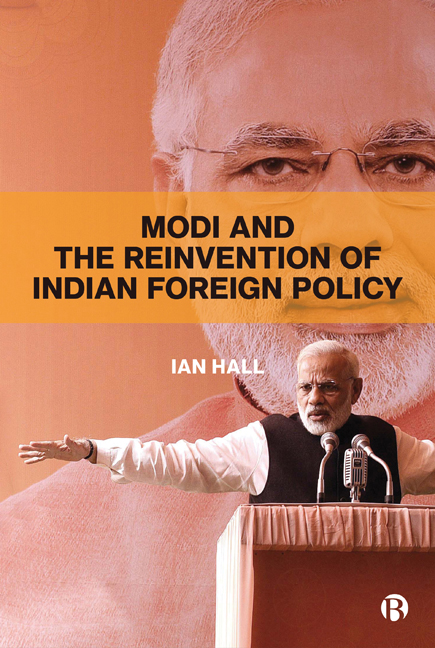Book contents
- Frontmatter
- Contents
- Abbreviations
- Glossary
- Notes on the Author
- Acknowledgements
- Preface
- 1 Introduction
- 2 Nonalignment to Multialignment
- 3 Hindu Nationalism and Foreign Policy
- 4 Modi and Moditva
- 5 World Guru India
- 6 Prosperity and Connectivity
- 7 National Power and Regional Security
- 8 Conclusion
- Notes
- References
- Index
- Frontmatter
- Contents
- Abbreviations
- Glossary
- Notes on the Author
- Acknowledgements
- Preface
- 1 Introduction
- 2 Nonalignment to Multialignment
- 3 Hindu Nationalism and Foreign Policy
- 4 Modi and Moditva
- 5 World Guru India
- 6 Prosperity and Connectivity
- 7 National Power and Regional Security
- 8 Conclusion
- Notes
- References
- Index
Summary
Modi's rise to become India's fourteenth Prime Minister is a tale of persistence, luck, ruthlessness, and indeed, talent. At some points, the facts of the story are also unclear and the evidence subject to competing interpretations. There are good reasons for this murkiness. Modi's biography – as for any politician – furnishes key elements in the wider narratives he and his allies would like to advance about his character and capacities. As a result, stories about him are carefully policed – as some of his biographers have found, when they have got too close to certain topics – by Modi and his supporters. For these reasons, and despite the publication of multiple studies of his life, what we know about his background, his rise to prominence, his political thinking, and his style of governing is patchy and overlain with at least two decades of mythmaking. But given the manner in which Modi personalised Indian foreign policy after 2014, and centralised decision making in his hands, the story of his life and of political career cannot be avoided.
Three particular things, I argue, are crucial to understanding Modi's reinvention of Indian foreign policy. The first is his character – his oftnoted ego and ambition, but also about his intellectual self-confidence, manifest in his apparent conviction that he is capable of learning and grasping the essentials of international relations and diplomacy, as he has with other areas of government. The second is Modi's political thought, including his beliefs about foreign policy, and how they converge with – and just as importantly, diverge from – the thinking of the broader Hindu nationalist movement, and especially to the Rashtriya Swayamsevak Sangh (RSS), which he joined as a boy. The last is his style of leadership and preferred mode of governing. In that area – and indeed in his thought – it shows how Modi's distinctive approach both adheres to and departs from the Hindu nationalist norm, such as it is.
To explore each of these issues, this chapter is divided into five sections. The first looks at Modi's upbringing, the break that he made with his family in the late 1960s, and his early days in the RSS.
- Type
- Chapter
- Information
- Modi and the Reinvention of Indian Foreign Policy , pp. 61 - 80Publisher: Bristol University PressPrint publication year: 2019



